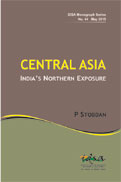Central Asia: India’s Northern Exposure
- 2015 |
- Monograph
 It is time for India to reconnect with a rapidly-changing Central Asia—increasingly the focus of world attention, and rivalry among the great powers over security and energy stakes. India too has high stakes in Central Asia, and a cogent policy outlook is long overdue. Partition and the subsequent Pakistani occupation of parts of Kashmir led to a direct physical cut-off on India’s northern flank. In reviving these links, India will find plenty of competition. Political uncertainty looms over the region, arising from the succession issues of its leaders. With the exception of Kyrgyzstan, the politics of Central Asia are unpredictable. The region is also the northern frontier of the Islamic world, hitherto unaffected by a fundamentalist wave. But behind the secular setting, a shift to a far more religious society is underway, and Central Asia is emerging as the next radical Islamic region. Chechnya, Ferghana, and Xinjiang, with their 100 million Salafi Muslims, could form a new arc of instability. Even the Islamic State in Iraq and Syria (ISIS) has heavily recruited from Central Asia. Central Asians had for long considered India a legitimate stakeholder in the region. To move ahead, India needs strategic clarity. It requires out-of-the-box thinking to foster regional economic integration in the North—even if it means cooperating with China to enlarge regional connectivity and trade, rather than struggling to find a model for itself. India must quickly recognise the evolving changes, challenges, and opportunities in this region to avoid being relegated to the periphery of Eurasian politics.
It is time for India to reconnect with a rapidly-changing Central Asia—increasingly the focus of world attention, and rivalry among the great powers over security and energy stakes. India too has high stakes in Central Asia, and a cogent policy outlook is long overdue. Partition and the subsequent Pakistani occupation of parts of Kashmir led to a direct physical cut-off on India’s northern flank. In reviving these links, India will find plenty of competition. Political uncertainty looms over the region, arising from the succession issues of its leaders. With the exception of Kyrgyzstan, the politics of Central Asia are unpredictable. The region is also the northern frontier of the Islamic world, hitherto unaffected by a fundamentalist wave. But behind the secular setting, a shift to a far more religious society is underway, and Central Asia is emerging as the next radical Islamic region. Chechnya, Ferghana, and Xinjiang, with their 100 million Salafi Muslims, could form a new arc of instability. Even the Islamic State in Iraq and Syria (ISIS) has heavily recruited from Central Asia. Central Asians had for long considered India a legitimate stakeholder in the region. To move ahead, India needs strategic clarity. It requires out-of-the-box thinking to foster regional economic integration in the North—even if it means cooperating with China to enlarge regional connectivity and trade, rather than struggling to find a model for itself. India must quickly recognise the evolving changes, challenges, and opportunities in this region to avoid being relegated to the periphery of Eurasian politics.
Ambassador (Prof) P Stobdan is a distinguished academician, diplomat, author and foreign policy/national security analyst. He has last served as India’s Ambassador Extraordinary and Plenipotentiary to the Republic of Kyrgyzstan. He earlier served in the National Security Council Secretariat (NSCS). He also served as Director of the Indian Cultural Centre, Embassy of India, Almaty, and headed the Centre for Strategic and Regional Studies (CSRS) in Jammu & Kashmir. He is the Founding President of the Ladakh International Centre, Leh. Currently, he is a Senior Fellow at the Institute for Defence Studies and Analyses. His recent publications include: Central Asia: Democracy, Instability and Strategic Game in Kyrgyzstan (2013) and India And Bhutan: The Strategic Imperative (2014). Ambassador Stobdan is also a leading columnist for the Indian Express and other national dailies.





